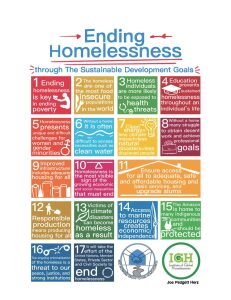
Despite intersecting with almost every one of the United Nation’s Sustainable Development Goals, homelessness is not mentioned once. Yet ending homelessness is essential for achieving the SDGs. If we end homelessness, we can achieve a more equitable and sustainable world.
How homelessness intersects with specific SDGs
SDG 1 – No Poverty:
Homelessness is both a symptom and a cause of extreme poverty. Providing stable housing enables people to access employment and education, helping to break the cycle of poverty.
SDG 3 – Good Health and Well-being:
Experiencing homelessness severely impacts physical and mental health. Secure housing improves access to healthcare, reduces preventable illnesses, and enables better mental health outcomes, contributing directly to this goal.
SDG 4 – Quality Education:
Experiencing homelessness disrupts children’s education and development. Ending family and youth homelessness ensures continuity in schooling, supports educational attainment, and enhances life opportunities for the next generation.
SDG 5 – Gender Equality:
Women, girls, and LGBTQ+ individuals often face gender-based violence and discrimination when experiencing homelessness. Safe, secure housing helps to protect marginalised groups and empowers them socially and economically.
SDG 8 – Decent Work and Economic Growth:
Stable housing is foundational to accessing and maintaining employment. By ending homelessness, individuals are better positioned to participate in the labor market, thus contributing to economic productivity and growth.
SDG 10 – Reduced Inequalities:
Homelessness is both a result and driver of inequality. Addressing homelessness will help to create a more inclusive society.
SDG 11 – Sustainable Cities and Communities:
Inclusive, safe, and affordable housing is central to sustainable urban development. Ending homelessness ensures that all residents can contribute to and benefit from city life, making communities more resilient and equitable.
SDG 16 – Peace, Justice, and Strong Institutions:
Those experiencing homelessness can face criminalization, exclusion, and lack of legal protection. Ensuring access to justice and fair treatment strengthens social cohesion and institutional trust.
SDG 17 – Partnerships for the Goals:
Ending homelessness requires collaboration between governments, NGOs, community groups, the private sector, and those with lived experience. Strong partnerships ensure coordinated, effective, and sustainable action. Ending homelessness ensures dignity, opportunity, and social justice, helping to build inclusive societies where no one is left behind. Investing in solutions to homelessness is not only a moral and human rights imperative but a strategic step toward achieving the 2030 Agenda for Sustainable Development. Despite intersecting with almost every one of the United Nation’s Sustainable Development Goals, homelessness is not mentioned once. Yet ending homelessness is essential for achieving the SDGs. If we end homelessness, we can achieve a more equitable and sustainable world.